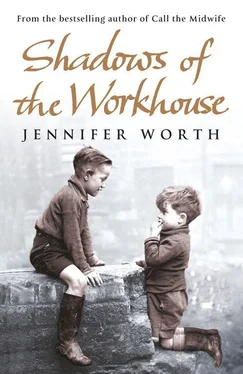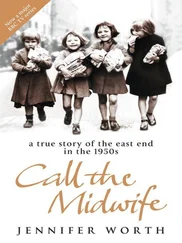Jennifer Worth - Shadows Of The Workhouse - The Drama Of Life In Postwar London
Здесь есть возможность читать онлайн «Jennifer Worth - Shadows Of The Workhouse - The Drama Of Life In Postwar London» весь текст электронной книги совершенно бесплатно (целиком полную версию без сокращений). В некоторых случаях можно слушать аудио, скачать через торрент в формате fb2 и присутствует краткое содержание. Жанр: Биографии и Мемуары, на английском языке. Описание произведения, (предисловие) а так же отзывы посетителей доступны на портале библиотеки ЛибКат.
- Название:Shadows Of The Workhouse: The Drama Of Life In Postwar London
- Автор:
- Жанр:
- Год:неизвестен
- ISBN:нет данных
- Рейтинг книги:5 / 5. Голосов: 1
-
Избранное:Добавить в избранное
- Отзывы:
-
Ваша оценка:
- 100
- 1
- 2
- 3
- 4
- 5
Shadows Of The Workhouse: The Drama Of Life In Postwar London: краткое содержание, описание и аннотация
Предлагаем к чтению аннотацию, описание, краткое содержание или предисловие (зависит от того, что написал сам автор книги «Shadows Of The Workhouse: The Drama Of Life In Postwar London»). Если вы не нашли необходимую информацию о книге — напишите в комментариях, мы постараемся отыскать её.
Shadows Of The Workhouse: The Drama Of Life In Postwar London — читать онлайн бесплатно полную книгу (весь текст) целиком
Ниже представлен текст книги, разбитый по страницам. Система сохранения места последней прочитанной страницы, позволяет с удобством читать онлайн бесплатно книгу «Shadows Of The Workhouse: The Drama Of Life In Postwar London», без необходимости каждый раз заново искать на чём Вы остановились. Поставьте закладку, и сможете в любой момент перейти на страницу, на которой закончили чтение.
Интервал:
Закладка:
“I tell you, I have never been more relieved in all my life than when he became Prime Minister and Minister of Defence in 1940. He had moral strength and a command of words that put fire in your belly. He united the people to stand up to Hitler and fascism, even though we had only broken bottles and carving knives to fight with. I honestly believe that without Churchill we would have lost the war, and Britain would be a Nazi state today.”
It was a sobering thought. I had always taken freedom for granted. I had been a child during the war, and had seen things through a child’s eyes. It was not until after the war, when I was about ten years old, that I saw on a cinema newsreel the ghastly pictures of Belsen, Auschwitz, Dachau, and the many other death camps dotted across Europe. This was when I began to understand the evil we had been fighting.
Also, being a country-born child, I had seen very little of the war itself. We lived only thirty miles from London, but life was peaceful and untroubled. My mother took in evacuees, which was good fun as far as I was concerned. Food was scarce and I didn’t see a banana or an orange until I was ten, but apart from that there might not have been a war going on at all. Where, I wondered, had Mr Collett spent the war?
His response was firm. London was his home and it was where he had remained throughout the war years. Sally didn’t want to leave London either – it was where she had been born and bred. They both felt there really was no other option. This attitude was fairly typical of Londoners. In 1939 large-scale evacuations of women and children occurred, but within six months most of them were back. They couldn’t cope with the countryside and returned in droves, preferring the risks of London to the quiet of the countryside.
I had heard a similar story from the Sisters. About seventy Poplar women, all of them pregnant, had been evacuated with two of the midwifery Sisters to Cornwall. One by one these young women returned, always giving the same reason: the silence got on their nerves; they were frightened of the trees and the fields; they couldn’t stand the wind moaning. At the end of six months there were only around a dozen left, so the Sisters themselves returned to the place where they were needed the most – the heart of Poplar.
In 1940 Mr Collett retired from the Post Office. Straight away he joined the ARP (Air Raid Precautions) and Sally joined with him. In the early months of 1940 the duties were to see that government directives were carried out. This mainly involved checking that people carried gas masks, that blackout regulations were being observed, that sandbags were filled and that air-raid shelters were suitably equipped. At first, ARP wardens were often called snoopers and laughed at, but in September 1940 the Blitz started and their work really began.
For three long months London was bombed every night, and there were sometimes daylight raids as well. Bombing was concentrated mainly on the Docklands, but this was also the area with the highest civilian population and hundreds of thousands of Londoners died or lost their homes.
If one looks at a map of London, the horseshoe loop in the Thames going round the Isle of Dogs is fairly obvious. From the air it is a landmark, and the German bomber pilots could not fail to see it. Bombs only had to be dropped on that target, and they were sure to hit either the docks or the housing around them. Thousands of tons of high explosive fell in less than three months. Poplar, housing up to 50,000 people to the square mile, was indeed a sitting target.
There were never enough air-raid shelters for such large numbers of people. In other parts of London people went into the Underground stations, but Poplar had none. The nearest underground was Aldgate. The government provided corrugated iron for people to build Anderson shelters in their gardens, but most Poplar people did not have a garden. Fortunately, many houses did have cellars, where people slept. The crypts of churches provided shelter for hundreds of people, and whole communities lived day and night in the churches. More than one baby was born in All Saints’ crypt, as I learned from the Sisters. The overcrowding was terrible. Each person had just enough room to lie down, and no more.
There was always the fear that plague or disease would sweep through the shelters. Water and sewage pipes were frequently hit, but somehow they were always repaired, at least enough to prevent the spread of disease. Gas and electricity supplies were often hit too, but they were always patched up as well.
Mr Collett said to me: “Looking back it seems impossible, but everyone worked day and night, with amazing good spirit.
“When you are living in such conditions, close to death, every day is a gift. You are happy every morning to see the dawn break, and to know that you are still alive. Also, death was no stranger to us. Poplar people were used to suffering. Poverty, hunger, cold, disease and death have been with us for generations, and we have just accepted them as normal, so a few bombs couldn’t break us.
“We were used to overcrowding, so the shelters didn’t seem too bad. The loss of a house or rooms was no worse than eviction, and most people didn’t have much furniture to lose anyway. A family would just move in with neighbours who still had a roof over their heads.
“It was an extraordinary time. Suffering and anguish were all around us, but so too, in a strange way, was exhilaration. We were determined not to be beaten. Two fingers up to Hitler, that was the attitude. I remember one old woman we pulled out of the rubble. She wasn’t hurt. She gripped my arm and said: ‘That bugger Hitler. ’E’s killed me old man, good riddance, ’e’s killed me kids, more’s the pity. ‘E’s bombed me ’ouse, so I got nowhere ’a live, bu’ ’e ain’t got me. An’ I got sixpence in me pocket an’ vat pub on ve corner, Master’s Arms, ain’t been bombed, so let’s go an’ ’ave a drink an’ a sing-song.’”
There was even more devastation when the firebombs came, and it was these that were responsible for Sally’s death. Both Mr Collett and his wife had had a premonition, sensing that one of them would be killed, but they didn’t know who, or when. The firebombs were small, and burst into flames when they hit the ground. They were easy to put out – it could be done with a sandbag, or even a couple of blankets – but if the fire spread it could set whole buildings alight. The government appealed for volunteer fire-watchers who would go to the top of tall buildings to keep a watch on the area around them. They gave the alert when a firebomb fell, and the men with sandbags rushed to the spot at once to put out the fire. These fire-watchers had to know the area well, and were mostly old people who didn’t have the physical strength to deal with all the digging and heavy lifting required in the streets. Sally volunteered. He said: “She and others went up the highest buildings with nothing but a tin hat to protect them from the explosives and firebombs. One night the building Sally was in got a direct hit. I never saw her again. Her body was never found.”
After telling me this sad story he paused, and stared into the fire, for a few minutes, then said softly: “She knew the risk. We both did. I’m glad that she was taken first, and not left on her own. Death is kinder than life. There is no more suffering beyond the grave. We will meet again soon, I hope.”
He said the words “soon, I hope” a second time, and I didn’t know what to say, so I asked him about his daughter.
Shirley’s skills in Morse code and telegraphy were classed as a “special occupation”. She joined the WAAF (Women’s Auxiliary Air Force) in 1940 and entered the Intelligence and Communications Corps of the RAF. Her father saw a little of her when she came home on leave, but mostly he didn’t even know where she was stationed, because all her work was highly confidential, and secrecy was tight. She had never married, and had always been very close to her parents. After her mother’s death she threw herself into her work.
Читать дальшеИнтервал:
Закладка:
Похожие книги на «Shadows Of The Workhouse: The Drama Of Life In Postwar London»
Представляем Вашему вниманию похожие книги на «Shadows Of The Workhouse: The Drama Of Life In Postwar London» списком для выбора. Мы отобрали схожую по названию и смыслу литературу в надежде предоставить читателям больше вариантов отыскать новые, интересные, ещё непрочитанные произведения.
Обсуждение, отзывы о книге «Shadows Of The Workhouse: The Drama Of Life In Postwar London» и просто собственные мнения читателей. Оставьте ваши комментарии, напишите, что Вы думаете о произведении, его смысле или главных героях. Укажите что конкретно понравилось, а что нет, и почему Вы так считаете.






![Theresa Cheung - The Dream Dictionary from A to Z [Revised edition] - The Ultimate A–Z to Interpret the Secrets of Your Dreams](/books/692092/theresa-cheung-the-dream-dictionary-from-a-to-z-r-thumb.webp)





